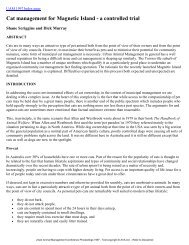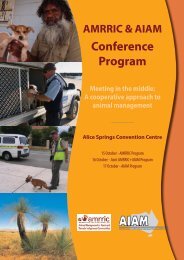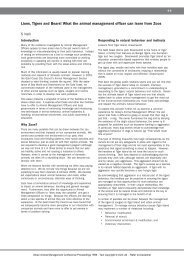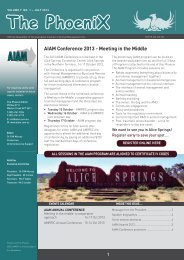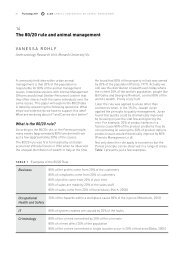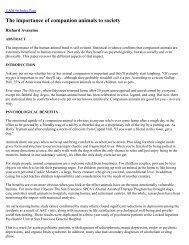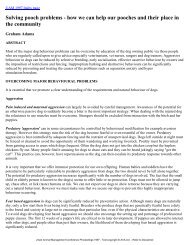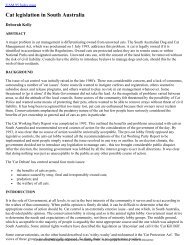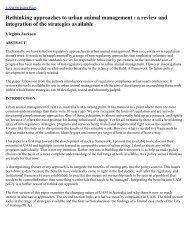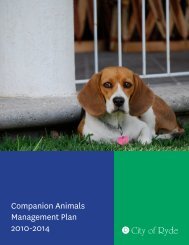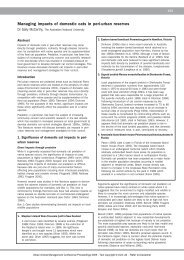Proceedings OF ThE - Australian Institute of Animal Management Inc
Proceedings OF ThE - Australian Institute of Animal Management Inc
Proceedings OF ThE - Australian Institute of Animal Management Inc
Create successful ePaper yourself
Turn your PDF publications into a flip-book with our unique Google optimized e-Paper software.
14 <strong>Proceedings</strong> 2012<br />
AIAM Annual Conference on <strong>Animal</strong> <strong>Management</strong><br />
There has been a tendency for “knee jerk” animal<br />
management legislation in Australia and a lack <strong>of</strong><br />
coordination between State and Local Authorities<br />
which frequently results in a lack <strong>of</strong> resourcing to<br />
enforce regulation in local government areas. One <strong>of</strong><br />
AIAM’s key goals is to improve the quality <strong>of</strong> legislation<br />
and to coordinate implementation through partnering<br />
local government and the animal management<br />
pr<strong>of</strong>essionals employed on the “frontline”.<br />
<strong>Animal</strong> <strong>Management</strong> Officer (AMO) competence<br />
and training<br />
The safety and competence <strong>of</strong> AMO is <strong>of</strong> major<br />
concern to the industry and AIAM. Great strides have<br />
been made in pr<strong>of</strong>essionalising animal management<br />
work and it is important that ongoing sustainable<br />
progress continues to be made. This will be difficult<br />
as local government budgets in many parts <strong>of</strong><br />
Australia are under ongoing financial pressure.<br />
Resourcing and funding service delivery<br />
As noted under governance and coordination, it is<br />
one thing to enact regulation, and it is another to<br />
ensure that there are adequate local resources<br />
available to enable animal management. Added to<br />
this is a progressive change in community attitude<br />
which now expects Local Government to resolve<br />
issues that tended previously to be tolerated or<br />
dealt with by the community itself. Nowadays people<br />
feel it is Councils problem to resolve all and any<br />
neighbourhood conflict issues. This huge shift in<br />
attitude has in turn brought about a lot <strong>of</strong> additional<br />
workload, expense and knee jerk reaction. Additional<br />
expenses are particularly the case in rural and<br />
regional areas/shires where animal management<br />
roles may be only part time and the distances great.<br />
Issues <strong>of</strong> welfare and well-being<br />
As Australia continues to urbanise and grow a<br />
complex set <strong>of</strong> issues around matters such as animal<br />
welfare, the human-animal bond, quality <strong>of</strong> life and<br />
the aging demographic are coming to the fore. In<br />
addition, there are opportunities and challenges<br />
related to our multicultural society and the differing<br />
traditions <strong>of</strong> animal welfare and the human animal<br />
bond that AMOs <strong>of</strong>ten have to deal with. Finally,<br />
indigenous communities also have a strong and<br />
unique relationship with their dogs. Remote<br />
aboriginal and Torres Strait Islander communities<br />
in particular face special animal management<br />
challenges that are ably addressed by our sister<br />
organisation, <strong>Animal</strong> <strong>Management</strong> in Rural and<br />
Remote Indigenous Communities (AMRRIC). AIAM<br />
has a coordinating and cooperative role in bringing<br />
many <strong>of</strong> these issues and stakeholders together.<br />
Engaging and partnering effectively with key<br />
stakeholders<br />
There are many stakeholders, organisations<br />
and individuals involved in animal management.<br />
Efficiently and effectively meeting the communication<br />
requirements <strong>of</strong> our many stakeholders is a<br />
significant challenge for AIAM which is expected to<br />
require the application <strong>of</strong> increased resources over<br />
the coming years.<br />
Fundraising and resourcing<br />
AIAM relies heavily on a single event – our annual<br />
conference – to generate operating funds. We face<br />
a major challenge in trying to expand our income<br />
sources and creating a more sustainable business<br />
model which will enable us to set up some kind <strong>of</strong><br />
permanent staffing.<br />
Environment and social sustainability and equity<br />
At the big picture level AIAM recognises that our<br />
society faces some major demographic challenges<br />
over the coming decades which are potentially farreaching<br />
and which will provide the broader context<br />
in which AIAM seeks to pursue its objectives around<br />
effective and sustainable animal management.<br />
The biggest breakthrough in 20 years<br />
One piece <strong>of</strong> innovative<br />
work stands out above<br />
all others.<br />
This was the creation<br />
<strong>of</strong> the South <strong>Australian</strong><br />
Dog and Cat<br />
<strong>Management</strong> Board.<br />
Looking back over<br />
the past 20 years <strong>of</strong><br />
<strong>Animal</strong> <strong>Management</strong><br />
activity in Australia,<br />
many useful innovative<br />
ideas have, in that<br />
time interval, been<br />
successfully converted<br />
into effective and<br />
progressive practices –<br />
practices that have in many cases been then shared<br />
across Australia. One such piece <strong>of</strong> innovative work,<br />
however, stands out above all others. This was<br />
the creation <strong>of</strong> the South <strong>Australian</strong> Dog and Cat<br />
<strong>Management</strong> Board. A brief history <strong>of</strong> this Board is<br />
as follows:<br />
In 1992, Ken McCann 19 was commissioned by<br />
the Minister <strong>of</strong> Environment and Planning in<br />
South Australia to undertake a comprehensive<br />
administrative review <strong>of</strong> dog control in that State.<br />
This review centrally involved Ken McCann visiting<br />
every Council in South Australia and having lengthy<br />
discussions about <strong>Animal</strong> <strong>Management</strong> with the<br />
relevant <strong>of</strong>ficers in each case. It showed unusual<br />
insight on the part <strong>of</strong> the Minister that this research<br />
was in fact focussed on Local Government.<br />
19 Ken McCann 1993. Dog control review. In <strong>Proceedings</strong> <strong>of</strong> the Second National Conference on Urban <strong>Animal</strong> <strong>Management</strong>, Penrith, NSW



